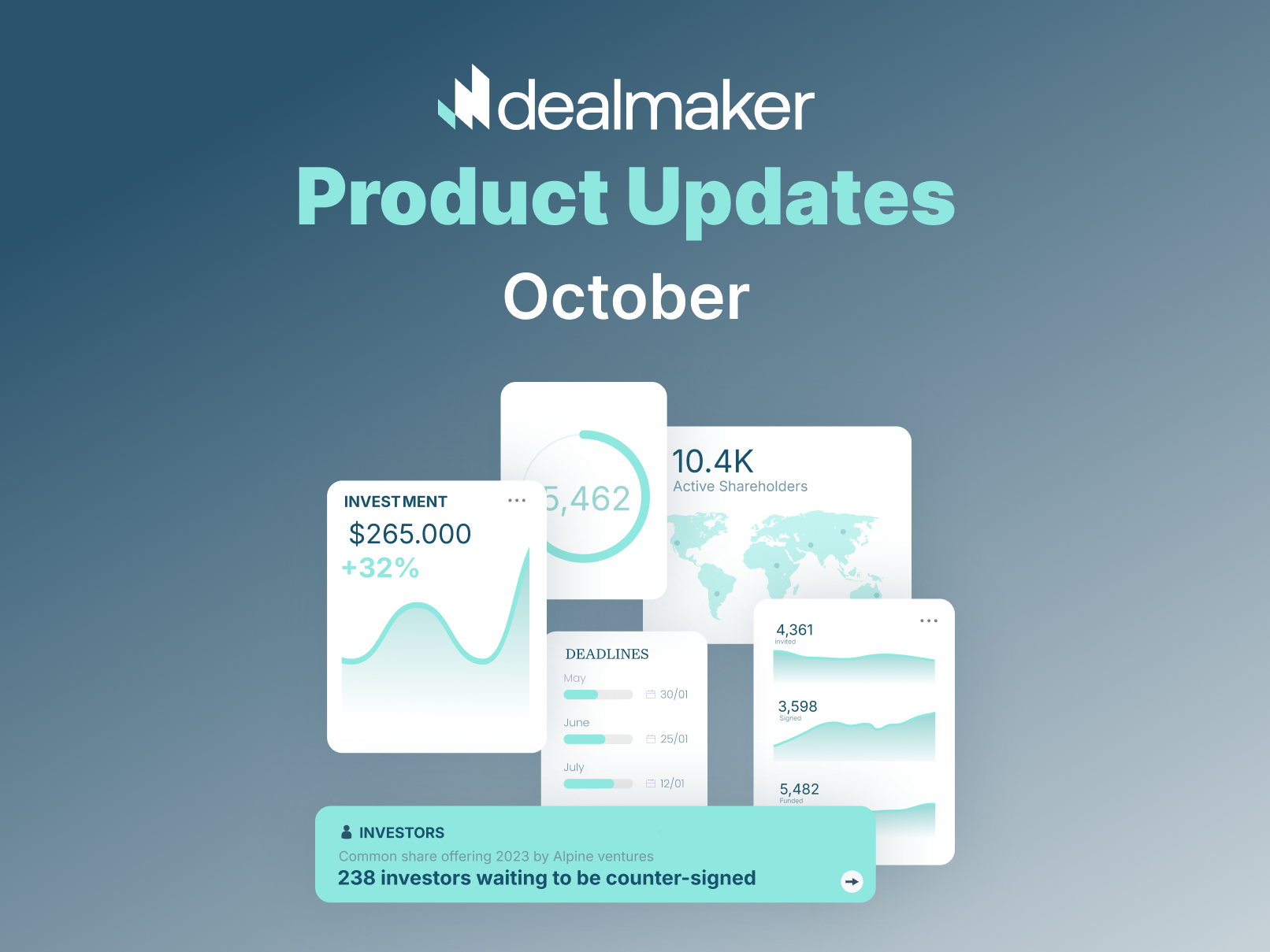Raise Capital
March 8, 2024
The 2024 Capital Reform Cheat Sheet
This story is ongoing and will be updated as new information becomes available. Last updated August 9, 2024.
As of August 9th, 2024, the U.S. House of Representatives has passed 12 of 15 bills intended to expand growing companies' access to capital, clear the ongoing IPO backlog, and pave new pathways to accreditation for sophisticated investors.
The 12 that passed in the House are now up for consideration in the Senate; the four that didn’t have been referred back to the House Financial Services Committee to be amended before a re-vote.
In short, we’re still in the early stages of this process—but we’ll be tracking all 15 bills closely as they make their way through the legislative system (and hopefully, onto President Biden’s desk). Those that receive bipartisan support in the Senate could be signed into law as early as this Fall.
Several of the 15 proposed changes are predicted to have a massive impact on the entire startup funding ecosystem if enacted. Let’s dig into all of the bills that directly or indirectly impact our industry, and what could happen if they are signed into law.
Clearing the capital backlog: Bills that break barriers for growing companies
H.R. 2799: The Expanding Access to Capital Act (McHenry)
Current Status: Passed House vote March 8, 2024 | Awaiting Senate vote
The Expanding Access to Capital Act (H.R. 2799) has been the most contentious of the introduced bills so far; although it was approved for a vote by the House Financial Services Committee, the bill was kicked back for amendments on the House floor. This is not particularly surprising, considering it’s also the most complicated of the bills introduced.
However, if enacted, HR 2799 would have a massive impact on online capital raising (also known as equity crowdfunding). One of the key changes it proposes is a substantial improvement to Regulation A+: doubling the maximum offering amount from $75M to $150M per 12-month period.
A $150M offering max would be a huge deal for Reg A+ and the overall online capital raising industry. It would make the exemption much more attractive to larger, more established startups that have greater capital requirements—especially in a market where companies are staying private longer and IPOs are hitting record lows.
The bill would also allow certain low-revenue companies to raise from accredited investors without needing to go through the cumbersome and expensive process of registering with the SEC. In short, H.R. 2799 would make it easier for small and medium-sized businesses to access capital (and more of it, too).
H.R. 2793: The Encouraging Public Offerings Act of 2023 (Wagner)
Current Status: Passed House vote June 5, 2023 | Awaiting Senate vote
This bill would allow issuers of securities to “test the waters” ahead of a potential IPO filing. Issuers would also be allowed to submit confidential draft registration statements with the SEC for review before the official filing.
H.R. 2812: The Middle Market IPO Underwriting Cost Act (Himes)
Current Status: Passed House vote June 5, 2023 | Awaiting Senate vote
This bill would require the SEC to study and report on the costs encountered by small- and medium-sized companies when undertaking initial public offerings and certain offerings exempt from securities registration requirements.
It’s clear that this bill was introduced, in part, in an effort to help clear the “IPO backlog” plaguing the capital markets. Recent data from Pitchbook suggests that there are currently 200+ companies in the US alone that are “ready” to go public but choosing to wait. While there are certainly a myriad of factors in play (including inflation, market turbulence, sinking valuations and more), proponents of this bill hope that auditing and reducing the overall costs associated with the process will encourage more companies to make the leap.
H.R. 2796: The Promoting Opportunities for Non-Traditional Capital Formation Act (Waters)
Current Status: Passed House vote May 30, 2023 | Awaiting Senate vote
This bill would require the SEC’s Office of the Advocate for Small Business Capital Formation to provide educational resources and host events to teach small businesses about alternative ways to raise capital. If enacted, this bill would especially focus on small businesses, businesses in rural areas, and businesses affected by natural disasters.
In its current form, the bill is introductory in nature—meaning it’s extremely vague as to which alternatives it would teach issuers about. However, it could have wide-ranging implications for online capital raising if the office responsible encourages those companies to leverage their communities as a capital source.
H.R. 2792: The Small Entity Update Act (Wagner)
Current Status: Passed House vote May 30, 2023 | Awaiting Senate vote
This bill would require the SEC to review and revise the definition of a small entity every five years. The goal is to gradually expand the definition and reduce unnecessary burden on small entities.
H.R. 2610 & H.R. 2608 (McHenry)
Current Status: Passed House vote June 5, 2023 | Awaiting Senate vote
These bills would make it easier for emerging growth companies to register with the SEC. HR 2610 would allow issuers to submit profit and loss (P&L) statements for the previous 2 years instead of 3. Similarly, under HR 2608, a company would not be required to present financial statements for any period prior to the earliest period already audited in connection with its initial public offering, such as a statement for an acquired company.
Changes to the Accredited Investor Definition
Among the 15 proposed rule changes are three that are intended to expand the Accredited Investor definition used by the SEC. If signed into law, all three could have significant implications for the online capital raising industry (and for the capital markets in general).
Currently, the definition of an accredited investor is based on income and net worth requirements that have not been updated in many years—and fail to account for the fact that simply having money doesn’t make a person particularly skilled at making it.
Let’s break down the three bills and what would change if they become law.
H.R. 2797: The Equal Opportunity for All Investors Act (Flood)
Current Status: Passed House vote May 30, 2023 | Awaiting Senate vote
If passed, this bill will allow individuals to qualify as accredited investors by passing an exam administered by the SEC. This test will be a way to prove sophistication for knowledgeable but non-wealthy and non-professional investors. That means it’ll probably be tough—but the bill does stipulate that it should still be accessible enough for non-pros to pass if they’ve done the appropriate amount of studying. The test would be offered free of charge to the public.
“If the past few years have taught us anything, it’s that retail investors have an important role to play in the capital markets, both public and private. It’s easy for critics to make jokes about what happened in 2021 with Gamestop and the meme stock rush—but the truth is, that movement was largely led by retail investors who actually had a pretty sophisticated understanding of the stock market.
We’re seeing the exact same thing in the online capital raising space. With the right education, there’s no reason why non-wealthy folks should need a specialized degree to do good diligence and make informed decisions. This bill would be a huge step in the right direction for investors who can prove they deserve to access opportunities they currently can’t.” - Rebecca Kacaba, DealMaker co-founder & CEO
H.R. 835: The Fair Investment Opportunities for Professional Experts Act (Hill)
Current Status: Passed House vote June 5, 2023 | Awaiting Senate vote
H.R. 835 would expand the pool of investors who qualify as accredited due to their professional knowledge, education, and professional experience.
H.R. 1579: the Accredited Investor Definition Review Act (Huizenga)
Current Status: Passed House vote June 5, 2023 | Awaiting Senate vote
This bill would give the SEC discretionary authority to change the accredited investor definition in the future, as long as the criteria they choose are at least as broad as the current regulations (in other words, they can’t make it more restrictive—only more accessible).
Notably, this bill would require the SEC to re-review the definition at least once every five years—with the specific intent of ensuring it’s as broad and accessible as it needs to be to serve American investors fairly.
What happens next
As mentioned, 12 of the 15 bills are now with the appropriate Senate committees for review and potential revision. The four that haven’t passed the House yet have gone back to committee to be amended before a re-vote on the House floor.
A quick reminder of how the process works:
- A bill is introduced to the House of Representatives and referred to the appropriate committee.
- The House committee will review and potentially revise the bills before deciding whether to send them to the House floor for a vote.
- The bills must be debated and voted on by the House, and need to win at least a simple majority (218 of 435 votes).
- They’ll then move to the Senate, which will assign the bills to a committee.
- The Senate committee will review and potentially revise the bills before deciding whether to send them to the Senate floor for a vote.
- If the bills win a majority vote in the Senate, they will be sent to the President.
- The President will either veto the bill or sign it into law (or do nothing, in which case the bill becomes law automatically after 10 days).
It’s a complicated system—which means there’s no way to know exactly if or when these bills will become law. However, we expect that at least a few of them will be landing on the President’s desk later this year (possibly as soon as early Fall).
We’ll continue to update this article as the bills proceed through the process—so bookmark it, keep it handy, and come back anytime you want to be brought up to speed.

Your submission has been received. We will reach out to you via email to schedule a call.
Oops! Something went wrong while submitting the form.



.png)





.webp)
.webp)
.webp)
%20(1).webp)

.webp)